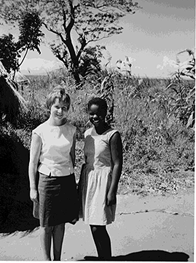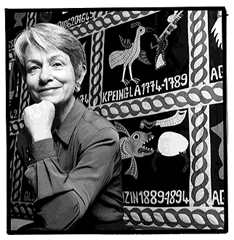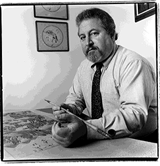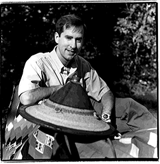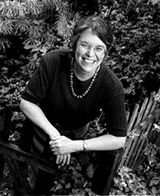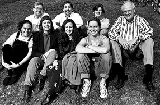BY JOHN D. THOMAS, ALLISON O. ADAMS, ANDREW W.M. BEIERLE, AND ERIN COYLE
A Sense
of Service
Emory is one of America's most prolific providers of alumni Peace Corps volunteers
The Rollins School of Public Health
During his inaugural address on January 20, 1961, President John F. Kennedy spoke not only to the nation but also to the world. "To those peoples in the huts and villages of half the globe struggling to break the bonds of mass misery," he said, "we pledge our best efforts to help them help themselves."
To help meet that global challenge, Kennedy signed an executive order establishing the Peace Corps six weeks later. Since then, more than one hundred fifty thousand Americans have volunteered for the Peace Corps, serving in some one hundred thirty countries.
Emory has played a significant role in the Peace Corps--259 Emory alumni have served in the organization. That number ranks Emory tenth in the nation in alumni Peace Corps volunteers among colleges and universities whose undergraduate enrollment is less than five thousand. Emory is the only institution in the Southeast to make the top twenty-five in that category.
"I think [that number of alumni] speaks volumes about Emory," Peace Corps Director Mark Gearan recently told Emory Magazine while he was on campus for a symposium on the Peace Corps' new efforts in South Africa. The event was co-sponsored by Emory's Program of African American Studies. "It says there is a sense of service [at Emory] and a commitment to help others to help themselves."
The Peace Corps is seeking to expand its scope in the near future, increasing its number of volunteers from about 6,600 to 10,000, and Gearan challenged current Emory students to consider serving. "You'll make a real difference in the lives of real people around the world," he said. "You'll learn an awful lot about yourself in the process and you will have an experience about international living and global understanding that will benefit you personally and professionally. Peace Corps volunteer status is respected in business, law, medicine, education--every walk of life."
Emory alumni are not the only members of the University community to have served in the Peace Corps. Faculty, staff, and current students from a broad range of disciplines are also veterans of the volunteer organization. What follows are profiles of some of the many people connected to the University who have given their time to the Peace Corps.--J.D.T.
Something new, fresh, and young
When Edna Bay earned her undergraduate degree from Duke University in 1965, joining the Peace Corps was an opportunity she couldn't refuse.
"Frankly, it had to do with the possibilities for a young woman with a college degree," explains Bay, an associate professor in Emory's Graduate Institute of the Liberal Arts. "In my graduating class, there were two tracks that [women] were taking. The lucky ones had diamond rings and were getting married that summer. And it was suggested to me that the best thing to do was to go to a large city and take a secretarial course in order to get gainful employment. There were not a lot of options. The Peace Corps was new, fresh, young, and it was not just a fun thing to do, it was also doing good for people."
Bay was a Peace Corps volunteer from 1966 to 1968 in the southeast African nation of Malawi, where she taught history in a girls' boarding school. "Our students were very bright, and they worked very hard," she remembers. She recalls an event that occurred while she was lecturing about American history, when Mother Nature helped out with an invaluable teaching aid.
"I remember talking about Henry Hudson getting stuck in ice and trying to talk about what ice is," she says, laughing. "And one day we had a very heavy rainstorm and there were big, marble-sized hailstones all over the place. So we all went outside and talked about ice. That was kind of fun to be trying to explain what snow and ice are and to have that happen."
Bay says the Peace Corps "absolutely changed my life," and she encourages her students to consider serving. "I still think it's a wonderful experience, and it does much more for the volunteer than it can possibly do for the community in which the volunteer serves."
Recently, Bay renewed her ties to Malawi through an organization called Friends of Malawi, which is in direct contact with Peace Corps volunteers in that country. "It's not only a way for ex-Peace Corps volunteers to keep in touch but also it has allowed us to donate to small projects. And through those connections I have gotten involved in Malawi Children's Village, a project designed to respond to the effects of the AIDS epidemic in one particular area of Malawi.
"It's a curious thing. When we went into the Peace Corps we always assumed that toward the end of our working careers we might go back and have another go at it. What we have discovered is that there is probably a more effective way to help out and serve Malawi, and this project is proving to be an outlet for us."--J.D.T.
Turning on to health care
As a Peace Corps volunteer from 1971 to 1973, Allan
Goldman '76PH was a health-care worker in the poorest province of South
Korea. When he thinks back about his time there, what he recalls most are
the people.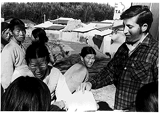
"I remember some of these country folks coming into the health center and their kindness, their honesty, their acceptance of life and of me," recalls Goldman, who was a member of the first class at Emory to receive a master's degree in public health. "They just were good people. Some of them did not have a lot of money, and they would come in for these market days and I remember on several occasions that folks gave me a present because they knew I wasn't with my family and I was all alone in their country and that it was a poor country. They felt so bad, and I was doing something nice for them."
In Korea, Goldman was in charge of a tuberculosis control program. When public health emergencies arose, however, his job description expanded to meet the crisis.
"It was sort of like the cowboy frontier," he recalls. "There would be a typhoid epidemic, and we'd go out to the bus stations and vaccinate people. Whenever there was a problem, we'd go out [and work on it]."
An Atlanta resident, Goldman has worked for Georgia's Department of Human Resources for more than a decade. As an assistant to the director of that agency, he is responsible for developing programs and for the financing and delivery of services to older adults. In 1985, he performed the first state study of Alzheimer's disease in Georgia, the results of which were used to develop services for Alzheimer's patients.
Goldman says his time in the Peace Corps inspired him to pursue a career in public health.
"The experience was really old-timey public health, and it was a turn-on. It was exciting, and you could see how you could make a contribution by preventing some of these diseases. It was really very meaningful."--J.D.T.
Only the beginning
Harbert Bernard '89C-'97MBA credits Emory's intimate
educational environment and two University mentors with his decision to
join the Peace Corps. Bernard served as an English teacher and community
development volunteer in Gabon, a small West African country, from 1991
to 1993.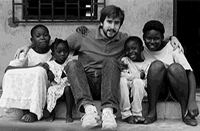
Bernard describes Emory as "a small school where you can have contact with your professors, a place that challenges you to be all you can be." He adds that Samuel Candler Dobbs Professor of History James L. Roark, himself a former Peace Corps volunteer, and Vice President for Institutional Advancement William H. Fox '79Ph.D., who at the time was dean of campus life, exerted "incredible influence" on him as a student in ways that ultimately led him to the Peace Corps.
"I wanted to do something meaningful at that time in my life, and when I went to work in corporate America, I had a hard time finding where I was adding value to society. I wanted to do something to express my volunteerism, my spirit of helping my fellow man," Bernard says.
Like many Peace Corps volunteers, Bernard says that what he received from his experience far outweighed the contributions he made.
"I went there very idealistically, thinking, 'Here I am to help.' And I tried my best. I'd like to think I was productive, that I was a good teacher and put in a lot of time developing secondary projects. But I learned so much more than I ever gave. . . .
"I learned a lot about people, about relationships. It was amazing to me--it would always take me an hour to walk the half mile to the market, because I stopped and greeted everyone. I had many personal, intimate conversations. It was very joyous. Here in the United States, you're very punctual, very productive; you have to get this report out, you have to be here at this time. It's how our modern economy works, but sometimes I think we as Americans forget about interpersonal relationships."
Bernard's Peace Corps experience has continued to influence his life. He says it gave him the confidence to pursue educational opportunities in Guatemala and Costa Rica as part of his MBA program and has brought a global perspective to his work with AGL Resources, the holding company of Atlanta Gas Light.
He continues his connection to the organization as president of the Atlanta Returned Peace Corps Volunteers group, which is active in such social causes as AIDS, hunger, and homelessness. "The Peace Corps really doesn't end with you leaving [your host country]--it's really just beginning," he says. "You take that social action, that concern for your fellow human beings, back to the U.S."--A.B.
Pursuing social change
When Barbara Lenkerd '65C graduated from Emory with a degree in political science, she immediately entered the Peace Corps. She was assigned to Ethiopia, where she taught high-school English in the midst of what she describes as tremendous social change.
"The education system in Ethiopia was expanding rapidly,"
she says. "A lot of my students came from small villages where the
village priests were still teaching that the world was flat. That was the
level of change taking place. And 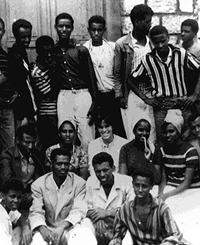 because
the populations who spoke these students' native languages were so small,
they had to learn an international language in order to get a real education
and relate to the rest of the world."
because
the populations who spoke these students' native languages were so small,
they had to learn an international language in order to get a real education
and relate to the rest of the world."
Lenkerd returned home in 1967 to a nation torn apart by social upheaval of a dramatically different kind. "There were [race] riots in Washington, D.C., and I lived right on the edge of where the riots were," she says. "U.S. Army tanks occupied downtown Washington. You'd walk on the streets and there would be soldiers with bayonets. It was totally different from anything I'd ever experienced."
Lenkerd's contrasting experiences of social transformation in Africa and what she found in America on her return coalesced into an intellectual and vocational pursuit. "I got very interested in the whole process of social change," she says.
After doing graduate work at the Johns Hopkins School of Advanced International Studies in Washington, Lenkerd eventually earned her doctoral degree in anthropology from Catholic University in 1994. Since then, she has studied a range of social, cultural, and organizational changes both in the United States and in developing regions such as Africa, Latin America, and the Philippines.
Now a senior research associate with the Project for Technology, Work, and Character in Washington, Lenkerd is engaged in a study focusing on the rapidly changing health-care industry. "The profit-making organizations have come in so fast that doctors are still reeling from all the change, and they really need to figure out how to organize themselves in new ways," she says.
"The Peace Corps did have a great deal of influence on my career because I got interested in these issues. It was quite new, and to have the opportunity to live for two years overseas was kind of incredible at the time. But I also thought of it as a continuation of my liberal education in a way that would allow me to make a contribution."--A.O.A.
THE ROLLINS SCHOOL OF PUBLIC HEALTH
A career-focusing experience
It's no coincidence that some twenty students in Emory's Rollins School of Public Health are returned Peace Corps volunteers.
"We actively recruit former Peace Corps volunteers because they come with such solid experience," says Jim Setzer, a senior associate in the Department of International Health and one of five Rollins School faculty members who are former Peace Corps volunteers. "Returned Peace Corps volunteers can deal with ambiguity," says Setzer, who worked in health-care delivery in Zaire in the 1970s. "Nothing seems to faze them. And it's a positive, career-focusing experience."
Matthew Nims, a student in the master of public health program, worked with the Peace Corps in the Dominican Republic from 1994 to 1996. He bears out Setzer's observation. "I was involved in child survival through latrine and water system construction projects," he says. "I loved it. My experience is the reason I am in school in public health." Nims hopes to pursue "Peace Corps-type" work after he graduates next year.
Nims' fellow returned volunteers, most of whom served in the Peace Corps within the last seven years, bring experiences from a variety of locations and service fields to their studies in the Rollins School. For example, Linda MacKinnon, a second-year master of public health student, volunteered in Niger, West Africa, from 1993 to 1995 as a health and nutrition extension agent. She worked in a health clinic in a tiny village near the border of Nigeria and promoted natural resource conservation among farmers in the region. Other returned volunteers who are now public health students engaged in work ranging from agricultural extension service in the Dominican Republic to teaching English in mainland China.
Many recent School of Public Health alumni also count Peace Corps experience among their credentials. John S. Moran, a physician who earned his master's degree in public health from the Rollins School in 1996, served as the area Peace Corps medical officer in Africa from 1981 to 1986. For the next two years, he was a medical advisor in the Peace Corps' Washington office. Today, he works for the Centers for Disease Control and Prevention as an advisor to the HIV/AIDS Prevention Project in Jakarta, Indonesia.
Setzer says efforts are currently underway to formalize ties between
the School of Public Health and the Peace Corps. He is working to establish
a Peace Corps Internationalist Program that would incorporate Peace Corps
fieldwork into a master of public health curriculum. "We would be
training people with the technical abilities the Peace Corps needs,"
says Setzer.--A.O.A.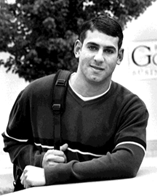
A change of plans
David R. London's decision to join the Peace Corps surprised him, because he had always been driven to pursue a traditional business career. After raising money as an intern for the Royal National Theater in England last summer, however, he changed his plans.
"I started to realize that what made me happy was not necessarily making money for myself, but for a cause," says London '98B.
Even a serious offer from a consulting firm while he was waiting to be accepted by the Peace Corps did not deter him. Two weeks after graduating from the Goizueta Business School with a B.B.A. degree in May, London traveled to Kenya to learn Swahili, Kenyan cultural norms, and rudimentary Kenyan business practices before serving in the Peace Corps' business advising program in that nation.
London says that for him the turning point came after his theater internship ended, when he backpacked through fifteen European countries, constantly yearning to learn more about the native people and their culture.
"I always felt like I was leaving without seeing anything," he says, "I started thinking, 'How can I see the world and make it a better place?' "
When he returned to Emory in the fall of 1997, he applied to the Peace Corps while simultaneously interviewing with consulting firms. He also worked as a manager for Emory's Annual Fund for a second year and was the student director of career services on the B.B.A. Council, acting as a liaison between business school students and the Emory career center.
London's leadership and professional experience impressed his Peace Corps recruiter, Frank Tizedes. "David was a unique case," says Tizedes, who adds that London is "motivated, self-directed, and able to work independently with little supervision."
While London says he expects his business experience in Kenya to enhance his career opportunities, he also hopes his time with the Peace Corps will be similar to that of his cousin, for whom setting up a loan program in South American villages was "the most rewarding experience" of his life.--E.C.
After this article ran in the print version of Emory Magazine, we received the following letter from Richard E. Piazza '64G:
I very much enjoyed your summer issue of Emory Magazine, especially the article on Peace Corps experiences. I wish I knew it was to be published as I was one of the first volunteers to join. I was mid-way through the master's program in physics at Emory when the Peace Corps was formed in 1961. I served from 19611963 and returned to Emory when I returned to the U.S. The entire story is told in my web page. It includes more than 300 pictures [and] audio recordings and describes the 2 1/2 years teaching physics in Nigeria as well as my 10,000-mile, 3-month motorcycle trip through much of Africa. It was recently chosen as Peace Corps site of the month. It should be of interest to anyone who has served in or is considering serving in the Peace Corps.
Return to Summer 1998 contents page
